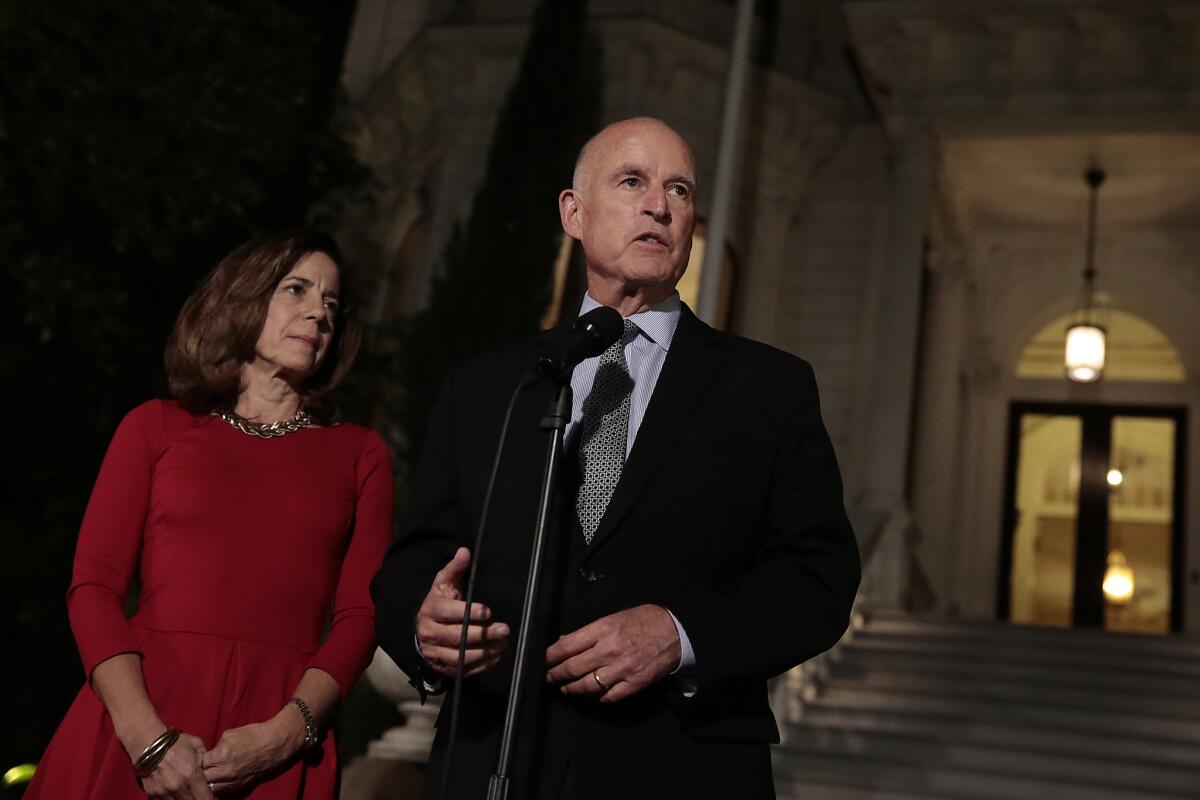California election results defy national trends -- mostly

- Share via
Reporting from Sacramento — The wave of Republican victories in Washington and state capitals across the nation turned into a small, but not insignificant, trickle by the time it hit the shores of California after Tuesday’s election.
Jerry Brown glided into a historic fourth term as governor and his fellow Democrats appear to have held onto every statewide office, once again proving that the Golden State exists in a political weather pattern that’s often immune to national influences.
But Republicans picked up enough legislative seats in the state Senate and, possibly, the Assembly to deny the Democrats a powerful two-thirds supermajority.
Live coverage continues: The election aftermath, and what it means for California
Those GOP victories will likely derail any attempt by Democratic lawmakers to extend the Brown-backed tax increase California voters approved in 2012, which temporarily raised the sales tax and income taxes on high earners to help revive state revenue flattened by the recession.
Democrats captured a legislative supermajority in 2012, giving them the power to raise taxes or place constitutional amendments on the ballot without a single Republican vote. That power quickly disintegrated after two Democratic state senators were charged with political corruption, and a third was convicted of voter fraud.
Some of Brown’s top political priorities – including increased restrictions on carbon emissions and building a high-speed rail line from Los Angeles to San Francisco -- also could face some strong headwinds now that the congressional Republicans control both the Senate and House.
The governor, however, didn’t appear too concerned when asked over the weekend about the prospect of a Republican-controlled Congress. With President Obama still in the White House, Brown’s priorities should be protected from congressional meddling, the governor said. On high-speed rail and climate change policy, California already has the political and financial wherewithal to forge ahead, with or without help from Congress, he said.
California voters Tuesday also put California at the forefront of the nation’s drug decriminalization debate by approving sweeping changes to California’s drug laws, making possession of heroin, methamphetamine, cocaine and other illicit drugs a misdemeanor instead of a felony.
Live coverage continues: The election aftermath, and what it means for California
With passage of Proposition 47, an estimated 40,000 offenders a year would qualify for lighter sentences. The ballot measure also reduced petty theft – stealing property worth $950 or less – from a felony to misdemeanor for all but the most violent criminals. Managers of Los Angeles County jails said they were prepared to immediately release offenders whose cases are reclassified by the courts as misdemeanors.
Along with Brown’s easy victory over little-known Republican challenger Neel Kashkari, the governor’s top two priorities on the state ballot also won handily: Proposition 1, a $7.5-billion water bond measure, and Proposition 2, which shores up the state’s rainy day fund.
Californians were not as kind to the other remaining statewide initiatives, rejecting Proposition 45, which would have given the elected state insurance commissioner power to reject increases in premiums for some health insurance plans; and Proposition 46, which would have increased the state’s cap on medical malpractice damages for pain and suffering to $1.1 million from $250,000 and required drug testing for doctors.
A tribal gambling measure, Proposition 48, seeking voter approval to allow the North Folk Rancheria of Mono Indians to build a new casino just north of Fresno, also was defeated.
In the tightest, and most watched, statewide race, state Supt. of Public Instruction Tom Torlakson appears to have won a narrow victory over challenger Marshall Tuck.
The race became the most expensive among statewide candidates this year, drawing $30 million in spending in a proxy war between teachers’ unions and those who seek to dramatically overhaul how schools are run.
Torlakson, who was backed by the unions, declared victory early Wednesday morning, although the vote count remained close.
“We knew that when Californians look for direction on how to improve education - they don’t look to Wall Street. They don’t look to Silicon Valley,’’ Torlakson said in a statement. “They look to the people who are in the schools in their neighborhood every day - the teachers, the school employees, the teacher’s aides, the nurses, the counselors.”
More to Read
Sign up for Essential California
The most important California stories and recommendations in your inbox every morning.
You may occasionally receive promotional content from the Los Angeles Times.














